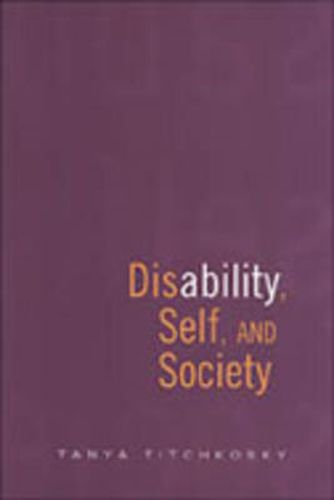Readings Newsletter
Become a Readings Member to make your shopping experience even easier.
Sign in or sign up for free!
You’re not far away from qualifying for FREE standard shipping within Australia
You’ve qualified for FREE standard shipping within Australia
The cart is loading…






Disability, Self, and Society speaks with authenticity about disability as a process of identity formation within a culture that has done a great deal to de-emphasize the complexity of disability experience. Unlike many who hold the conventional sociological view of disability as a ‘lack’ or stigmatized identity, Tanya Titchkosky approaches disability as an agentive (not passive) embodiment of liminality and as a demonstration of socially valuable in-between-ness. She argues that disability can and should be a ‘teacher’ to, and about, non-disabled or ‘temporarily abled’ society.
Titchkosky’s poignant reflections on disability rely on the thought of Hannah Arendt as well as her personal experience as an individual with dyslexia living with a blind partner; she uniquely draws on her own and others’ situations in order to demonstrate the sociopolitical character of disability. A thoughtful and cohesive integration of narrative and theory, Disability, Self, and Society presents a critical Canadian contribution to the growing subject of disability studies.
$9.00 standard shipping within Australia
FREE standard shipping within Australia for orders over $100.00
Express & International shipping calculated at checkout
Disability, Self, and Society speaks with authenticity about disability as a process of identity formation within a culture that has done a great deal to de-emphasize the complexity of disability experience. Unlike many who hold the conventional sociological view of disability as a ‘lack’ or stigmatized identity, Tanya Titchkosky approaches disability as an agentive (not passive) embodiment of liminality and as a demonstration of socially valuable in-between-ness. She argues that disability can and should be a ‘teacher’ to, and about, non-disabled or ‘temporarily abled’ society.
Titchkosky’s poignant reflections on disability rely on the thought of Hannah Arendt as well as her personal experience as an individual with dyslexia living with a blind partner; she uniquely draws on her own and others’ situations in order to demonstrate the sociopolitical character of disability. A thoughtful and cohesive integration of narrative and theory, Disability, Self, and Society presents a critical Canadian contribution to the growing subject of disability studies.